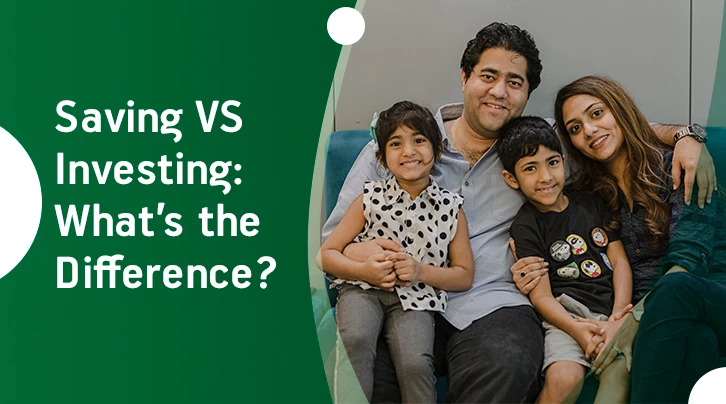Summary
The terms ‘saving’ and ‘investing’ are often used interchangeably. But there are significant differences between the two. Read this post to know more.
Content
Saving and investing are probably the most misunderstood concepts. People often use these terms interchangeably, as if they are synonyms. But they are not.
While savings and investments play critical roles in personal finance, it is important to understand the differences between the two to plan your finances effectively. Let's take a detailed look at what they mean and how they are different-
What is Saving?
In the simplest terms, saving is a form of accumulating wealth. For instance, you save money in your bank account for basic expenses, emergencies, vacations, or purchasing a new smartphone. It is an effective way to fulfil your short-term financial objectives and keep yourself prepared for emergencies.
Savings generally carry minimal risk and are highly liquid. In other words, your money is safe in a saving instrument, and you are free to withdraw and deposit as and when you like. However, the returns, if any, are low.
What are the Pros and Cons of Saving?
Pros
Savings helps you manage basic expenses
Helps in building a safety net for emergencies
Can be used to achieve short-term objectives
Minimal risk and highly liquid
Cons
What is Investing?
It is through investing that you can grow your money. It requires you to put your money into financial instruments like stocks, mutual funds, bonds, etc., that can generate potentially higher returns in the longer run. But the higher potential returns also come with higher risk, which varies depending on the instrument you select.
A major difference between saving and investing is while saving helps you with everyday expenses, short-term goals, and emergencies, investing is mostly dedicated to medium and long-term financial goals. As investment products carry a higher level of potential risk, people diversify their investments to try and reduce the risk.
What are the Pros and Cons of Investing?
Pros
Generate potentially higher returns than saving
Can be used to achieve medium to long-term objectives
Building a diversified portfolio can help reduce risk
Cons
Investments could lead to losses, especially in short-term
Mostly ideal for longer tenures
Requires knowledge, patience, and discipline
Major Differences Between Saving and Investing
Let’s take a quick look at the differences between saving vs. investing –
Parameter |
Saving |
Investing |
Meaning |
Setting aside some portion of your income in a saving instrument |
Putting your money in financial instruments for long-term growth |
Ideal for |
Everyday expenses, emergencies, short-term objectives |
Medium to long-term financial goals |
Liquidity |
High |
Generally not as liquid as saving instruments |
Risk |
Low risk |
Higher risk |
Returns |
Generally lower |
Potentially higher |
Examples |
Savings bank account, certificate of deposit (CD), etc. |
Stocks, mutual funds, bonds, etc. |
Is Investing Better Than Saving or Vice Versa?
So, whether you should save or invest? Is one better than the other? It’d be wrong to say investing is better than saving or vice versa, as both serve different purposes.
No matter who you are or what you do, you’ll have basic expenses you must take care of. At the same time, you’ll also have short-term goals and the need to have an emergency corpus. These aspects make saving vital for every individual.
Similarly, long-term goals like retirement planning, purchasing your dream home, and a child's higher education or marriage requires a thoughtful investment plan. Unfortunately, saving instruments generally don't generate enough returns to help you with objectives that require significant money. Thus, a combination of saving and investing is highly recommended.
Also read : Drawing up your short-term and long-term goals!
Understanding the Difference Between Saving and Investing
While saving and investing are both important, knowing the differences is vital for effective decision-making. When you understand these concepts in detail, you can work on a financial plan that matches your objectives, risk appetite, and investment horizon.
You should start saving and investing as early in life as possible so that you can give your money enough time to deliver the expected returns. You can build your financial plan on your own or consult with a professional financial advisor for personalized advice.
You may also Read about - Types of Mutual Funds
Mutual Fund investments are subject to market risks, read all scheme related documents carefully.





 1800-270-7000
1800-270-7000




